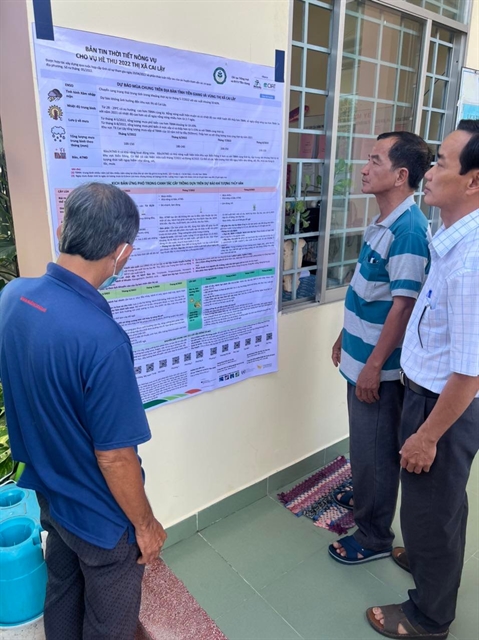 Society
Society


|
| A seasonal weather bulletin posted at the People's Committee of Tân Hưng Commune, Cái Bè District, Tiền Giang Province. Photo : the Tiền Giang provincial Crop Production and Plant Protection Sub-Department |
HÀ NỘI — Eight provinces with 351 communes and more than 130,000 farmers in the Mekong Delta and the South Central regions have implemented a seasonal weather bulletin.
The seasonal weather bulletin of the DeRISK SE project has assisted farmers to make better decisions, helping to reduce production costs, improve efficiency and boost cultivation.
The project “Applying seasonal climate forecasting and innovative insurance solutions to climate risk management in the agricultural sector in Southeast Asia” (DeRISK SE Asia), has been in Việt Nam for four years.
In Việt Nam, climate change and extreme weather have caused an increase in damage to agriculture. Drought and saltwater intrusion from the El Nino weather phenomenon in 2016 affected production in the Mekong Delta region, causing great economic losses.
Meanwhile, current climate information has not completely met the needs of people, leading farmers to make inaccurate decisions about choosing plant varieties and care.
Seasonal weather bulletins are produced based on seasonal, monthly or 10-day forecasts.
A bulletin is built on the interaction of stakeholders including hydro-meteorological forecasters, agricultural staff, irrigation staff and representatives of farmers to produce, interpret and disseminate specific recommendations for agricultural planning and decision-making.
Võ Thị Kim Phượng, Deputy Director of Tiền Giang Province's Crop Production and Plant Protection Sub-Department, said that it plans to develop and maintain the seasonal weather bulletin in the region.
“It provides timely, local-appropriate seasonal and weather recommendations to farmers to help them reduce production costs, reduce damage caused by weather changes, increase crop yields, and income for farmers,” Phượng said.
The Department of Southern Crop Production has issued a directive on the application of seasonal weather bulletins to the Mekong Delta region.
The DeRISK SE Asia project builds climate risk management systems that apply advances in seasonal climate forecasting and insurance products, thereby protecting farmers and businesses in key agricultural value chains in Việt Nam from the economic losses associated with climate change.
The DeRISK SE Asia project was implemented by the World Meteorological Organisation (WMO), the University of Southern Queensland (USQ), and the International Biodiversity Alliance.
The project was supported by the International Climate Initiative of the German Federal Ministry for the Environment, Nature Conservation and Nuclear Safety.
In Việt Nam, it was implemented jointly with the Ministry of Agriculture and Rural Development. VNS




